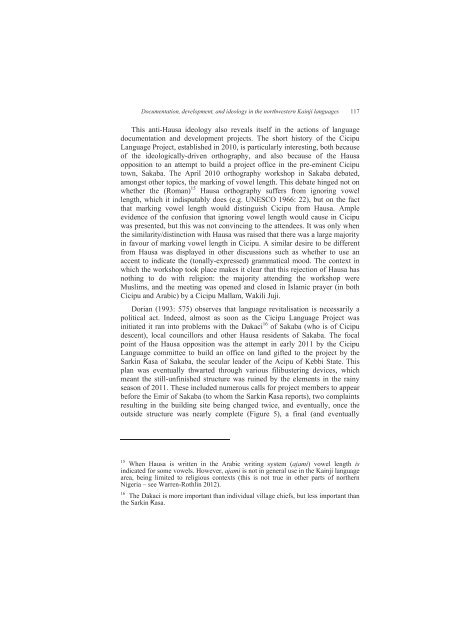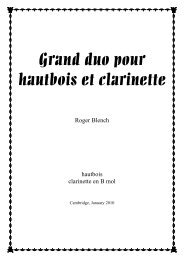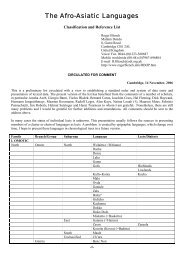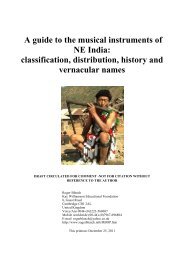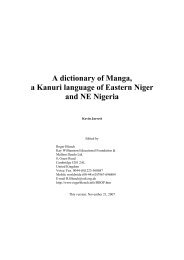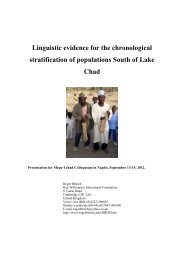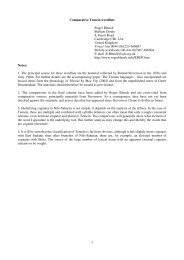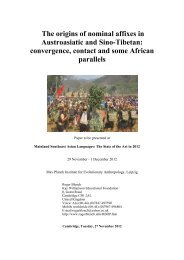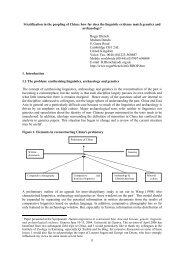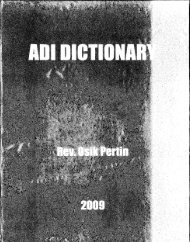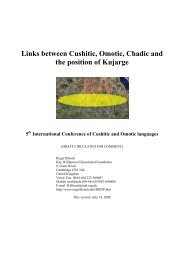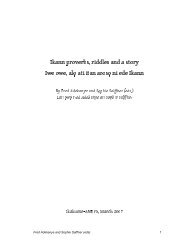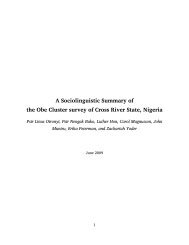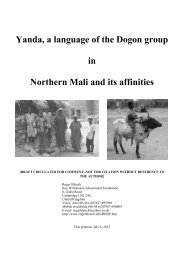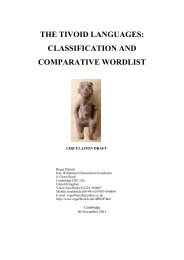Documentation, development, and ideology in the ... - Roger Blench
Documentation, development, and ideology in the ... - Roger Blench
Documentation, development, and ideology in the ... - Roger Blench
Create successful ePaper yourself
Turn your PDF publications into a flip-book with our unique Google optimized e-Paper software.
<strong>Documentation</strong>, <strong>development</strong>, <strong>and</strong> <strong>ideology</strong> <strong>in</strong> <strong>the</strong> northwestern Ka<strong>in</strong>ji languages 117<br />
This anti-Hausa <strong>ideology</strong> also reveals itself <strong>in</strong> <strong>the</strong> actions of language<br />
documentation <strong>and</strong> <strong>development</strong> projects. The short history of <strong>the</strong> Cicipu<br />
Language Project, established <strong>in</strong> 2010, is particularly <strong>in</strong>terest<strong>in</strong>g, both because<br />
of <strong>the</strong> ideologically-driven orthography, <strong>and</strong> also because of <strong>the</strong> Hausa<br />
opposition to an attempt to build a project office <strong>in</strong> <strong>the</strong> pre-em<strong>in</strong>ent Cicipu<br />
town, Sakaba. The April 2010 orthography workshop <strong>in</strong> Sakaba debated,<br />
amongst o<strong>the</strong>r topics, <strong>the</strong> mark<strong>in</strong>g of vowel length. This debate h<strong>in</strong>ged not on<br />
whe<strong>the</strong>r <strong>the</strong> (Roman) 15 Hausa orthography suffers from ignor<strong>in</strong>g vowel<br />
length, which it <strong>in</strong>disputably does (e.g. UNESCO 1966: 22), but on <strong>the</strong> fact<br />
that mark<strong>in</strong>g vowel length would dist<strong>in</strong>guish Cicipu from Hausa. Ample<br />
evidence of <strong>the</strong> confusion that ignor<strong>in</strong>g vowel length would cause <strong>in</strong> Cicipu<br />
was presented, but this was not conv<strong>in</strong>c<strong>in</strong>g to <strong>the</strong> attendees. It was only when<br />
<strong>the</strong> similarity/dist<strong>in</strong>ction with Hausa was raised that <strong>the</strong>re was a large majority<br />
<strong>in</strong> favour of mark<strong>in</strong>g vowel length <strong>in</strong> Cicipu. A similar desire to be different<br />
from Hausa was displayed <strong>in</strong> o<strong>the</strong>r discussions such as whe<strong>the</strong>r to use an<br />
accent to <strong>in</strong>dicate <strong>the</strong> (tonally-expressed) grammatical mood. The context <strong>in</strong><br />
which <strong>the</strong> workshop took place makes it clear that this rejection of Hausa has<br />
noth<strong>in</strong>g to do with religion: <strong>the</strong> majority attend<strong>in</strong>g <strong>the</strong> workshop were<br />
Muslims, <strong>and</strong> <strong>the</strong> meet<strong>in</strong>g was opened <strong>and</strong> closed <strong>in</strong> Islamic prayer (<strong>in</strong> both<br />
Cicipu <strong>and</strong> Arabic) by a Cicipu Mallam, Wakili Juji.<br />
Dorian (1993: 575) observes that language revitalisation is necessarily a<br />
political act. Indeed, almost as soon as <strong>the</strong> Cicipu Language Project was<br />
<strong>in</strong>itiated it ran <strong>in</strong>to problems with <strong>the</strong> Dakaci 16 of Sakaba (who is of Cicipu<br />
descent), local councillors <strong>and</strong> o<strong>the</strong>r Hausa residents of Sakaba. The focal<br />
po<strong>in</strong>t of <strong>the</strong> Hausa opposition was <strong>the</strong> attempt <strong>in</strong> early 2011 by <strong>the</strong> Cicipu<br />
Language committee to build an office on l<strong>and</strong> gifted to <strong>the</strong> project by <strong>the</strong><br />
Sark<strong>in</strong> asa of Sakaba, <strong>the</strong> secular leader of <strong>the</strong> Acipu of Kebbi State. This<br />
plan was eventually thwarted through various filibuster<strong>in</strong>g devices, which<br />
meant <strong>the</strong> still-unf<strong>in</strong>ished structure was ru<strong>in</strong>ed by <strong>the</strong> elements <strong>in</strong> <strong>the</strong> ra<strong>in</strong>y<br />
season of 2011. These <strong>in</strong>cluded numerous calls for project members to appear<br />
before <strong>the</strong> Emir of Sakaba (to whom <strong>the</strong> Sark<strong>in</strong> asa reports), two compla<strong>in</strong>ts<br />
result<strong>in</strong>g <strong>in</strong> <strong>the</strong> build<strong>in</strong>g site be<strong>in</strong>g changed twice, <strong>and</strong> eventually, once <strong>the</strong><br />
outside structure was nearly complete (Figure 5), a f<strong>in</strong>al (<strong>and</strong> eventually<br />
15 When Hausa is written <strong>in</strong> <strong>the</strong> Arabic writ<strong>in</strong>g system (ajami) vowel length is<br />
<strong>in</strong>dicated for some vowels. However, ajami is not <strong>in</strong> general use <strong>in</strong> <strong>the</strong> Ka<strong>in</strong>ji language<br />
area, be<strong>in</strong>g limited to religious contexts (this is not true <strong>in</strong> o<strong>the</strong>r parts of nor<strong>the</strong>rn<br />
Nigeria – see Warren-Rothl<strong>in</strong> 2012).<br />
16 The Dakaci is more important than <strong>in</strong>dividual village chiefs, but less important than<br />
<strong>the</strong> Sark<strong>in</strong> asa.


